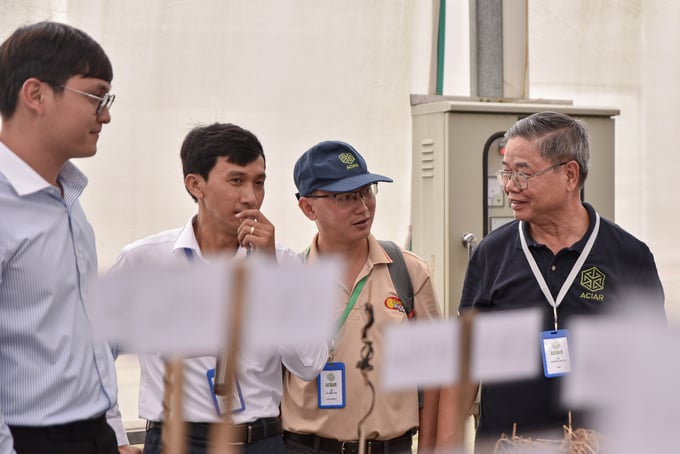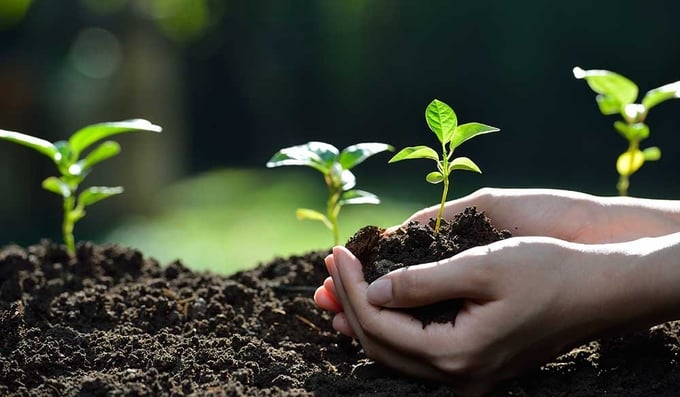May 31, 2025 | 16:55 GMT +7
May 31, 2025 | 16:55 GMT +7
Hotline: 0913.378.918
May 31, 2025 | 16:55 GMT +7
Hotline: 0913.378.918
Recently, the Ministry of Agriculture and Rural Development, in collaboration with the US Department of Agriculture, launched the Fertilizer Right Project with a budget of $4.4 million. To ensure the project's success, experts have analyzed various challenges in the "right" fertilization application.
During discussions on technical solutions to effectively implement the project, Dr. Nguyen Van Bo, former Director of the Vietnam Academy of Agricultural Sciences, highlighted the significance of having a fertilizer forum involving domestic and international high-level experts. This not only provides opportunities for farmers to adopt effective farming practices but also aids in developing appropriate fertilizer management policies.
With years of experience in soil science and fertilizers, experts have identified several conditions for effective fertilizer use. This knowledge contributes to better fertilizer management, particularly inorganic fertilizers, thereby enhancing crop income and nutrient utilization efficiency.
Firstly, the quality of fertilizers is pivotal in determining the success of practical fertilizer applications. Fertilizers must contain essential nutrients in appropriate ratios, supplemented with efficiency-enhancing factors such as microorganisms, nano-materials, and smart materials.
It is imperative to have an up-to-date database on soil characteristics to recommend proper fertilizer use. However, this remains a significant gap that requires improvement. "Regularly conducting investigations, analyses, and updates of soil characteristic databases are essential for identifying limiting factors and determining the appropriate dosage and type of fertilizer required for each crop, variety, and soil type," analyzed the expert.

Mr. Nguyen Van Bo (right) is a leading expert on soil science. Photo: Quynh Chi.
In proper fertilization, farmers play a pivotal role as they possess the capacity to "read" the sky, soil, and trees to fertilize accurately. Hence, it is essential to equip farmers with the requisite knowledge and skills for utilizing fertilizers effectively and sustainably. This entails ensuring that the goals, plans, and technical solutions within the project are comprehensible, easy to implement, and cost-effective.
The Fertilizer Right Project is funded by the US Department of Agriculture, under the auspices of the Global Fertilizer Challenge Program of the US Department of State.
The project's activities are structured and executed based on the "4R" principle in nutrient management, encompassing the right type, right dose, right timing, and right method. Mr. Nguyen Van Bo highlighted variations in understanding the "4R" principles even within the project framework, emphasizing the necessity for consensus among stakeholders to facilitate training, mentoring, and communication.
Addressing the project's objectives, Mr. Nguyen Van Bo suggested that the envisaged goal of "Developing and evaluating alternative solutions to chemical fertilizers" is impractical and prone to causing confusion. He recommended refining it to "Developing solutions to integrate nutrient sources from chemical fertilizers, organic fertilizers, and other nutrient sources."

Fertilizer quality determines the project’s success.
According to Dr. Nguyen Van Bo, Vietnamese fertilizer manufacturers hope this project will provide access to next-generation fertilizers and advanced production technologies from the United States. They are willing to import suitable products and technologies to Vietnam.
Currently, Vietnam is confronted with a significant challenge in managing crop and livestock by-products. While these by-products contain substantial nutrient content, efficient metabolism is essential to maximize their value and mitigate their adverse environmental impact. Mr. Bo urged the project to support technology for processing by-products, starting with straw to supplement organic fertilizer and provide nutrients for rice plants.
During the forum, Dr. Nguyen Van Bo also advised that in order to ensure high-quality fertilizer and transparent management, relevant authorities should consider enhancing the stages of licensing fertilizer production and distribution based on stringent principles. This includes rigorous inspections of production conditions and post-inspection of products. For fertilizers, it is crucial to establish minimum standards for nutrients, organic matter, beneficial microorganisms, while also setting maximum thresholds for heavy metals, harmful microorganisms, and moisture. Such an approach necessitates stricter and more thorough inspection and examination processes.
Given that Vietnam's fertilizer industry is gradually standardizing, the country should study and draw lessons from nations with significant fertilizer usage such as the US, Japan, Korea, Thailand, and China regarding fertilizer management. Hence, Dr. Nguyen Van Bo proposed adding a "Fertilizer Legislation" component to the project to assist Vietnam in accessing advanced and effective fertilizer management models. Additionally, to facilitate the swift entry of next-generation fertilizers into Vietnam, experts recommend enhancing the testing and approval process for new fertilizers.
Increased attention and investment in research and development of new fertilizers will lead to new policies and societal awareness. Mr. Bo stressed that altering perceptions about fertilizers and their environmental impact is a prolonged endeavor, requiring concerted efforts across all levels.
Echoing the sentiments of technology billionaire Bill Gates, who stated, "40% of the earth's population is alive today because, in 1909, a German chemist named Fritz Haber found a way to synthesize ammonia," Mr. Nguyen Van Bo underscores the extensive history of scientific research in fertilizers. The industry's achievements have lifted hundreds of millions of people worldwide out of poverty. Therefore, managers, researchers, and users must responsibly harmonize the most intelligent methods to provide nutrients to plants, thereby contributing to improving public health and safeguarding the environment.
Translated by Quynh Chi

(VAN) Several scientists and farmers are experimenting with soil treatment in some key durian-growing regions such as Cai Lay (Tien Giang), Dak Song, Gia Nghia, and Dak R’lap (Dak Nong).
/2025/05/25/4127-3-073637_820.jpg)
(VAN) Thanks to the promotion from an FAO-implemented project, vegetable production in greenhouses in Moc Chau has seen strong development, from 1.5 hectares in 2021 to nearly 50 hectares in 2024.

(VAN) FAO has recently supported USD 140,000 to implement the project 'Risk mitigation human-animal interface risks through disease control initiatives in pig farming.'

(VAN) The People's Committee of Tra Vinh province has approved an adjustment to the investment policy for the Green Hydrogen Plant project, increasing its area to approximately 52.76 hectares.
![Reducing emissions from rice fields: [2] Farmers’ commitment to the soil](https://t.ex-cdn.com/nongnghiepmoitruong.vn/608w/files/news/2025/05/05/dsc08881jpg-nongnghiep-140632.jpg)
(VAN) Clean rice cultivation model in Thuong Tan commune, Bac Tan Uyen district, is assisting local residents in achieving sustainable agriculture by substantially reducing costs, increasing productivity, and protecting the environment.

(VAN) At the conference to disseminate Resolution No. 68, AgriS introduced its digital agricultural ecosystem and reaffirmed its commitment to accompanying the Government in promoting private sector development and sustainable agriculture.

(VAN) 'Blue Ocean - Blue Foods' initiative is designed to restore marine ecosystems and establish sustainable livelihoods for local communities by cultivating a minimum of 1,000 hectares of cottonii seaweed in the first three years.